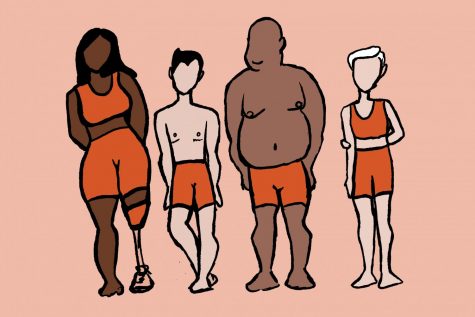‘Yes, I am fat’
People share ways to overcome body insecurity and become more body positive
March 11, 2020

As she stared at herself in the mirror, she was ashamed and disgusted. The person looking back at her was not who she was in love with. It all started when the boys would verbally abuse her and call her fat. For twenty years, she hated her body.
Virgie Tovar is an activist, author and one of the nation’s leading experts on body positivity and fat discrimination. According to Tovar, at the age of five, children start to learn about fat and start noticing different shapes and sizes.
Tovar, however, didn’t learn about body shame in her household.
She was raised in a family where everyone had the same body type. Instead, she was first exposed to body shame at the school playground as a kindergartener.
“I grew up in a really loving household,” Tovar said. “I would run to the bathroom when I would take off all my clothes as a little fat four year old. And I would run back out to see my grandmother. And I would spread out my arms and legs and I would jiggle for her.”
By the age of 11, Tovar was determined to change her body.
She wanted to impress her crush and hoped that if she lost weight, he would want to walk into the sunset with her. Tovar lost a significant amount of weight. What she didn’t realize was her body went into starvation mode.
People around started to notice the change and it encouraged her to keep going, but it wasn’t a healthy way to lose weight, Tovar said.
Her doctor was proud of her and told her if she continued losing weight, maybe she could date his son.
According to Tovar’s research, 68% of women in the U.S. are plus size.
A plus size woman spends an additional $9,000 to $19,000 every year towards basic needs and weight loss products, according to a 2014 Guardian article.
One of the biggest issues, Tovar said, is discrimination towards fat people: fatphobia. Fatphobia is a form of bigotry and discrimination.
It is a social problem that positions fat people as inferior in society. It positions weight gain as a sign of moral failure and lack of self-control, according to Tovar.
The only solution to ending fatphobia is not asking fat people to become thin, Tovar said. It’s simply ending fatphobia, Tovar said.
Meghan Hoeye, a senior majoring in family and child life, works at the Wellness Center. In the Wellness Center, Hoeye is responsible for covering topic areas such as nutrition, body image and exercise.
“I have had a lot of issues with my own body and self-image, and it’s something that I’ve been passionate about for a very long time,” Hoeye said.
Hoeye said the weight on the scale does not define anyone and everyone is different. Hoeye said this is a topic that can affect a person’s mental health and their ability to function on a daily basis.
“You don’t need to change to be worthy of existing. You don’t need to change anything about yourself,” Hoeye said.“You’re still worthy of your education, you’re still worthy of having a partner, you’re still worthy of having a job, you’re worthy of traveling, you’re worthy of anything that you want to do. You don’t have to change.”
The best thing to do is to surround yourself in a positive atmosphere. This can be accomplished by unfollowing social media pages that don’t promote self-love and surrounding yourself with positive people, Hoeye said.
“Seek help and talk to people, so your friends, your family,” Hoeye said. “Surround yourself with people who are going to be supportive of you. Tell them that you’re struggling and ask them to not say body-negative things to you.”
Sabeth Jackson is a health education coordinator at the Wellness Center. According to Jackson, teens and young adults are very conscious about their appearance and body image.
Through the process of losing weight many young adults develop unhealthy habits that can affect their health in the long term.
Many of these thoughts and ideas are stereotypes from society and the body image presented on media platforms. Disney movies and Barbie dolls create a slim body image in the minds of girls at a young age, according to Jackson.
“People who read like fashion magazines will feel markedly more depressed after they have read them and like, more critical of their bodies after they’ve read them. And the reason is because we’re seeing image after image after image of what we think,” Jackson said.
Jackson has a two-year-old daughter who she wants to have a strong mindset and love towards her body. Jackson said it can be hard to create a positive mindset, especially with all the toxic messages we are surrounded with.
“Try to treat yourself the way you would want to treat other people, you know, with kindness,” Jackson said.


youssef somer • Mar 13, 2020 at 3:11 pm
Thanks for the nice blog. It was very useful for me. I’m happy I found this blog. Thank you for sharing with us,I too always learn something new from your post.
I have a program for obese people who want to get rid of this which makes their life difficult
Do You Have What It Takes To Complete The 28-Day Keto Challenge?
Step up and prove what you’re made of!
Start your transformation now…
It is the best selling product that helped a lot to lose their weight
TAKE THE CHALLENGE click here :http://bit.ly/3aStWa5